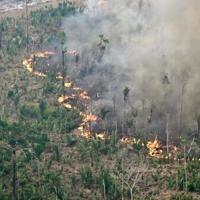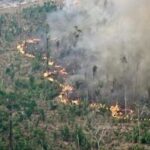According to a major study published on Tuesday, deforestation continued at a rapid rate last year, far surpassing pledges to end the practice by 2030. Forests nearly the size of Ireland were lost in 2023, with 6.37 million hectares (15.7 million acres) of trees cut down and burned, as reported by two dozen research organizations, NGOs, and advocacy groups.
This level of deforestation “significantly exceeded” what was necessary to eliminate deforestation by the end of the decade, a goal set by more than 140 leaders in 2021.
Forests are vital for regulating water cycles, sequestering CO2, and are home to 80 percent of the world’s terrestrial plant and animal species.
Ivan Palmegiani, a biodiversity and land use consultant at Climate Focus, and lead author of the “Forest Declaration Assessment” report, stated that deforestation has worsened globally since the beginning of the decade, with only six years left until the critical deadline to end deforestation.
In 2023, 3.7 million hectares of tropical primary forest disappeared, mainly due to factors like soya cultivation and nickel mining.
– Soya and nickel –
The report highlighted alarming rises in deforestation in Bolivia and Indonesia, with a 351 percent increase in Bolivia’s deforestation between 2015 and 2023. Indonesia also saw a sharp rise in deforestation last year, driven by demand for eco-friendly materials like viscose and nickel for electric vehicle batteries.
Brazil, despite having the highest deforestation rates globally, has made progress in protecting the Amazon but has seen an increase in deforestation in the Cerrado, a tropical savannah region.
– Degraded forests –
The report also pointed out the role of logging, road building, and fires in forest degradation, with an area twice the size of Germany degraded in 2022. Strong policies and enforcement are needed to meet global forest protection targets.
Despite the European Commission’s proposal to postpone the entry into force of its anti-deforestation law, there is a call to rethink consumption and production models to reduce reliance on natural resources.
jmi/eab/np/fg





